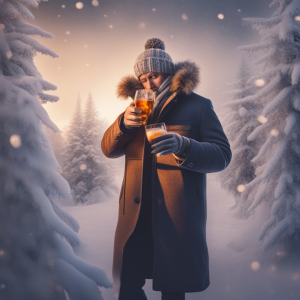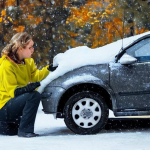Understanding the Dangers of Alcohol Consumption in Extreme Cold Weather
As we face the harsh challenges of winter, particularly in extremely cold climates, our instinctive response to seek warmth may lead us to alcohol. However, it's crucial to recognize the significant dangers associated with this choice. This article highlights the severe risks tied to alcohol consumption in frigid environments, explaining why this habit is not only perilous but also ineffective for maintaining body warmth. By increasing your awareness of these dangers, you empower yourself to make informed decisions that prioritize your safety and well-being during the treacherous winter conditions.
Before exploring the associated dangers, it’s vital to debunk the common myth that alcohol can serve as a warming agent. When consumed, alcohol induces dilation of blood vessels near the skin’s surface, creating a misleading sensation of warmth. While this initial feeling may be comforting, it fails to address the essential need for maintaining a stable internal body temperature. In fact, the effects of alcohol can be detrimental, potentially impairing your ability to withstand cold weather and significantly heightening the risk of experiencing severe conditions like hypothermia and other serious health issues.
 One of the most critical hazards associated with drinking alcohol in cold environments is the elevated risk of dehydration. Alcohol acts as a known diuretic, which means it stimulates urine production, leading to significant fluid loss. To compound this issue, the cold air typically present during winter is drier, causing our bodies to lose moisture more quickly. The combination of these factors can lead to dangerously low hydration levels, which are essential for maintaining overall health and survival. Dehydration can adversely affect not only physical performance but also cognitive functions, resulting in difficulties in clear thinking and making rational decisions during critical situations.
One of the most critical hazards associated with drinking alcohol in cold environments is the elevated risk of dehydration. Alcohol acts as a known diuretic, which means it stimulates urine production, leading to significant fluid loss. To compound this issue, the cold air typically present during winter is drier, causing our bodies to lose moisture more quickly. The combination of these factors can lead to dangerously low hydration levels, which are essential for maintaining overall health and survival. Dehydration can adversely affect not only physical performance but also cognitive functions, resulting in difficulties in clear thinking and making rational decisions during critical situations.
The Impact of Alcohol on Judgment and Awareness During Cold Weather
Another significant consequence of alcohol consumption is its ability to impair cognitive function and decision-making skills. In survival scenarios, the ability to make clear, rational decisions is vital for ensuring personal safety. Alcohol can cloud judgment, making it increasingly challenging to respond appropriately to hazards. This diminished capacity for reasoning can lead to accidents and poor choices, which can be particularly disastrous when faced with extreme cold. Maintaining vigilance and awareness of one’s surroundings is essential; however, alcohol undermines this necessity, resulting in a heightened likelihood of errors that could jeopardize your safety.
Moreover, alcohol can severely disrupt the body’s natural mechanisms for regulating its temperature. Upon consumption, alcohol causes blood vessels in the skin to expand, which leads to increased heat loss. Initially, this may create a temporary feeling of warmth, but over time, it accelerates the loss of core body heat, a critical component for survival. This creates a dangerous cycle in which the fleeting warmth leads to a rapid decline in core temperature, thus increasing the risk of life-threatening conditions such as hypothermia. It is crucial to understand that while alcohol may seem to offer a quick solution for cold, it ultimately heightens vulnerability.
Understanding the Alarming Connection Between Alcohol Use and Hypothermia Risks
When discussing the risk of hypothermia, it is essential to comprehend how alcohol consumption can mask the early warning signs of this perilous condition. Hypothermia occurs when the body’s core temperature drops below the normal range, typically falling below 95 degrees Fahrenheit (35 degrees Celsius). Symptoms may include shivering, confusion, fatigue, and reduced coordination. However, alcohol suppresses our body’s natural responses, making it increasingly difficult to recognize these critical indicators. By the time the signs of hypothermia become apparent, it may already be too late to prevent serious injury or even life-threatening consequences.
In winter survival situations, there are numerous safer and more effective alternatives to alcohol for maintaining body warmth. Here are some strategies that can significantly enhance your ability to stay warm and safe:
1. Dress in Layers to Maximize Warmth: Wearing multiple layers of clothing is essential for effectively trapping warm air. Begin with thermal base layers, add insulating mid-layers, and finish with a windproof and waterproof outer layer to create a protective barrier against the cold elements.
2. Ensure Your Clothing and Footwear Stay Dry: Moisture leads to rapid heat loss, so it's crucial to keep your clothing and footwear dry at all times. Opt for waterproof materials and change into dry garments whenever necessary to help maintain warmth.
3. Insulate Yourself from the Cold Ground: Using sleeping mats or insulation pads can significantly decrease heat loss, especially during sleep. This precaution is vital for conserving body heat during extended periods spent in cold environments.
4. Choose Warm, Non-Alcoholic Beverages: Instead of resorting to alcohol, consider enjoying hot beverages like tea, coffee, or hot chocolate. These drinks provide warmth without the adverse side effects linked to alcohol consumption.
5. Seek or Construct Shelter for Protection: Actively looking for or building a shelter can significantly lessen exposure to harsh winds and freezing temperatures. A well-constructed shelter is crucial for retaining body heat, greatly improving your chances of staying warm.
6. Fuel Your Body with High-Calorie Foods: Consuming nutrient-rich foods that are high in calories can supply your body with the energy necessary to generate heat. Foods like nuts and fatty fish serve as excellent sources of healthy fats that can be particularly beneficial.
Recognizing the risks associated with alcohol consumption during freezing temperatures is vital for anyone engaged in winter survival situations. Despite the temporary sensation of warmth, alcohol can lead to dehydration, impaired decision-making, disrupted temperature regulation, and can mask the symptoms of hypothermia. By avoiding alcohol and implementing safe, effective strategies, we can enhance our chances of surviving and thriving in harsh winter environments. Remain alert, prepare thoroughly, and prioritize your safety above all else.
The post Hazards of Alcohol Consumption in Extreme Cold Conditions appeared first on Survival Bite.
The Article Alcohol Consumption Hazards in Extreme Cold Conditions Was Found On https://limitsofstrategy.com


This article raises an essential point that often gets overlooked during those chilly winter months. Personally, I’ve found myself reaching for a warm drink after spending time outdoors, thinking it would help stave off the cold. However, understanding how alcohol actually affects the body is a game-changer.
I really appreciate this article shedding light on a topic that’s often overlooked during the winter months. It’s so easy to fall into the trap of thinking that a warm drink can keep us cozy, especially when the cold bites. I’ve had friends who would bundle up and head outdoors for a bonfire with a few beers, completely unaware of how that can backfire in the cold. The way alcohol tricks our bodies into feeling warm can be seriously misleading.
It’s an important topic you’re addressing here, especially as winter sets in and people seek comfort in different ways. I remember last winter, when a friend of mine insisted we warm up with a drink after an ice hockey game. Initially, the thought of sipping something by the fire felt inviting. But what you highlight about the misleading sensation of warmth that alcohol provides really resonates.